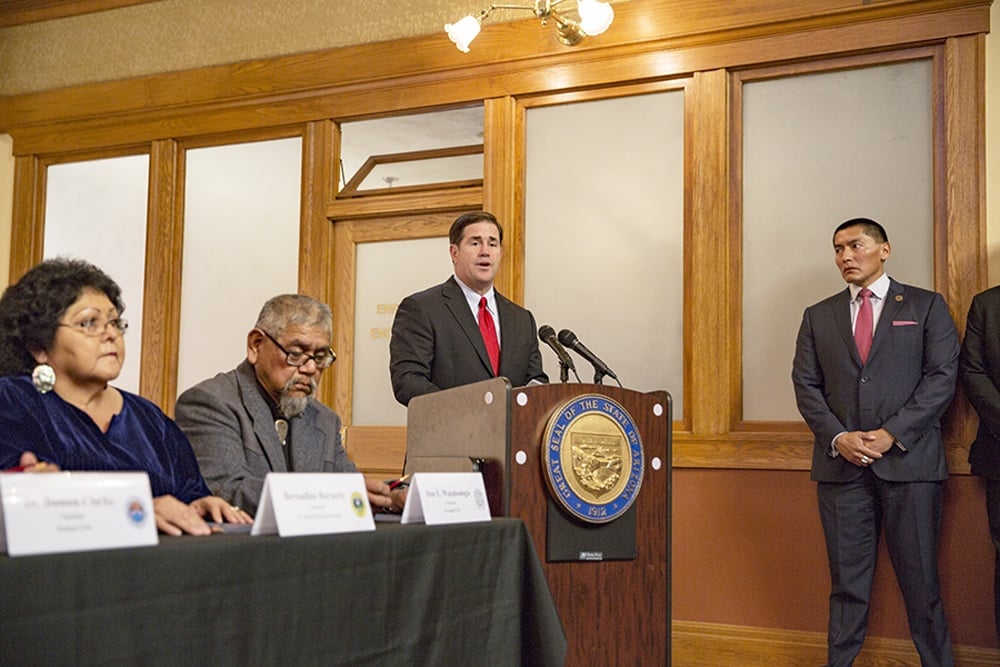Arizona Tribal Gaming Bounces Back, Encouraging Casino Expansion Interests
Posted on: August 3, 2017, 04:00h.
Last updated on: August 3, 2017, 04:31h.
Tribal gambling will have provided Arizona a financial benefit of more than $26 million in the second quarter of 2017, an increase of 4.8 percent compared to the same period a year ago. The Arizona Department of Gaming issued its revenue report on Wednesday, providing encouragement for expansion-minded interests may have been growing hesitant about development plans.

Tax revenue from tribal gaming had fallen in recent quarters. Arizona is home to 16 tribes operating 23 Class III casinos. All have compacts with the state, which require them to share up to eight percent of gross revenue.
Of the $26 million in tribal tax money received, more than $13 million will be allocated toward education improvements, and $6.5 million will be earmarked for emergency services.
More Where That Came From
Native American casinos are flourishing across the United States.
According to the National Indian Gaming Commission, gross gaming revenue from tribal casinos surpassed the $30 billion mark for the first time in 2016 at $31.2 billion. That represented a 6.9 percent increase on FY2015, when revenue totaled $29.2 billion.
Despite widespread expansion of commercial gambling in states searching for untapped revenue, tribal casinos are seeing few signs of market saturation. In Arizona, there’s reason to expect taxes from Native American casinos to continue to grow.
The Tohono O’odham Nation recently struck a deal with the state to transform its Class II electronic bingo hall near Phoenix into a full-fledged Class III casino. The tribe is spending $400 million on its Glendale property to place slot machines and table games just a little more than a mile away from the University of Phoenix stadium, home of the NFL Arizona Cardinals.
Sports Betting on Horizon?
Speaking of football, the National Indian Gaming Association (NIGA) recently announced its support of legalizing sports gambling on the federal level and repealing the 1992’s Professional and Amateur Sports Protection Act (PASPA).
The US Supreme Court will soon review the law in light of an appeal from New Jersey, which claims it should have the right to repeal its own prohibitions on sports betting in its Atlantic City casinos and horse racetracks. Lower courts have ruled PASPA overrides any new New Jersey law.
“As one of the key stakeholders in these discussions we want to ensure that if legalized, our members have the opportunity to offer this activity as an additional source of revenue,” NIGA Chairman Ernie Stevens said.
Indian gaming takes place in 28 states, with 66 tribes currently engaged in gaming operations. There are 411 Indian casinos in the US that offer slots and/or table games.
However, most compacts say nothing about sports gambling. NIGA wants to make sure that should Supreme Court nullify the federal law, thus giving states the right to allow sports betting, that commercial casinos will not be the only ones allowed to benefit.
Related News Articles
Most Popular
Las Vegas Overstated F1 Race’s Vegas Impact — Report
Vegas Strip Clubs Wrestle in Court Over Animal Names
Most Commented
-
End of the Line for Las Vegas Monorail
— April 5, 2024 — 90 Comments -
Mega Millions Reportedly Mulling Substantial Ticket Price Increase
— April 16, 2024 — 6 Comments -
Long Island Casino Opponents Love New York Licensing Delays
— March 27, 2024 — 5 Comments -
Nearly Abandoned Mall Outside Vegas Soon to Have Only One Tenant
— March 12, 2024 — 5 Comments
















No comments yet